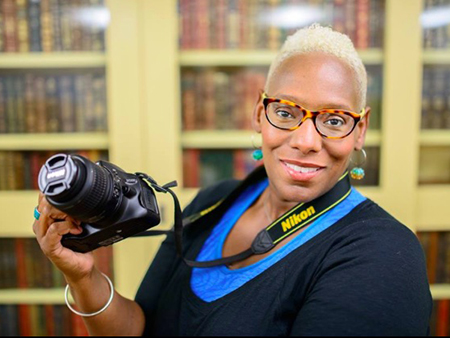Emerson Game Design Project to Teach Healthy Relationships

Angela Cooke-Jackson isn’t playing games when it comes to empowering disadvantaged youth to live healthy lives.
But she’s hoping some of the teens she works with will.
Cooke-Jackson, assistant professor of health and behavioral science and director/co-founder of Emerson Literacy Education and Empowerment Project (eLEEP), along with Emerson Engagement Lab project manager Wade Kimbrough, recently were awarded a $5,000 grant from Seattle-based Ludus Project to build a game that teaches young people about sexual health and media literacy.
“One of the things we really want to make sure happens is that the invention of it, and the idea, comes from the young people,” Cooke-Jackson said of the project, called Game Design, Health Literacy, and Urban Communities: Teens as Public Health Leaders.
The game project will be part of a larger partnership that eLEEP has with the Boston Public Health Commission’s Peer Leadership Institute.
For the last three summers, dozens of teens from the Institute visit the campus each week and work with Emerson College student/mentors to learn the basics of health and media literacy, as well as innovative methods of delivering that knowledge to other youth in their Boston communities.
Through the grant, about ten of those teens this summer will get an intensive, two-day training in game design and structure at the Engagement Lab. Then, over the course of the six-week program, the teens will devise and test different iterations of a game that they will use to teach sexual and relationship health to their peers.
Kimbrough, who is working abroad this semester, and the Engagement Lab will handle the technical aspects of the project and bring the teens’ ideas to fruition.
“You’re really, really allowing it to be student-driven, and you’re allowing their innovations to come to the forefront as you’re creating it,” Cooke-Jackson said.
She said while the game will be usable for training purposes, she also hopes that the students who work on the project will get a deeper knowledge and understanding of the subject matter through the act of creating a game.
Cooke-Jackson said she hopes she can get more grant money to study the initiative’s impact on the teens once it’s up and running.
“If they’re creators of these things, are they more empowered because they’re the lead on the [development] of them, they’re really in it and getting their hands dirty? Are they having more agency around their own sexual health and/or relationship development?” Cooke-Jackson asked. “My assumption is that they are…so my goal is to really observe that over time. That’s kind of anecdotally what I’m seeing happening.”
Nicole Daley, director of the Strong Start Initiative in the Boston Public Health Commission’s Division of Violence Prevention, said that during the course of the BPHC’s Peer Leadership Institute, the act of creating content makes students think harder about their own beliefs and assumptions.
“What we’ve found for our peer leaders is that a lot of the work is also about their own internal values shifting,” Daley said. “With our teams, what we find is as they begin to become role models in an area and produce content, they have to reevaluate what their values are.”
Categories